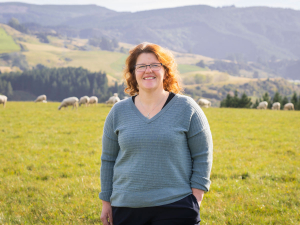NZ scientists make breakthrough in Facial Eczema research
A significant breakthrough in understanding facial eczema (FE) in livestock brings New Zealand closer to reducing the disease’s devastating impact on farmers, animals, and rural communities.
 AgResearch senior scientist Dr Suzanne Rowe says they’ve managed to breed sheep that produce less methane while still producing good quality meat.
AgResearch senior scientist Dr Suzanne Rowe says they’ve managed to breed sheep that produce less methane while still producing good quality meat.
AgResearch scientists say they’ve managed to breed sheep that produce less methane while still producing good quality meat.
NZ has been a world leader in the recent development of breeding sheep that belch out less methane – a relatively short-lived but potent greenhouse gas that contributes to climate change.
The latest progress stems from more than a decade of research by AgResearch scientists, supported by the industry through the Pastoral Greenhouse Gas Research Consortium (PGgRc) and Beef + Lamb New Zealand Genetics, as well as the Government via the New Zealand Agricultural Greenhouse Gas Research Centre (NZAGRC).
The result is sheep that naturally emit less methane as a product of their digestion and it is believed this trait can be bred for and passed down through generations.
AgResearch senior scientist Dr Suzanne Rowe says the latest published research provides a valuable insight into the implications of breeding for lower methane. She says once it was known they could breed sheep producing less methane, they set about determining what the impact on the animal might be from birth through to parenthood.
“The work was carried out in flocks across NZ – using thousands of measures over several years – to demonstrate that low methane emissions can be included into breeding goals without sacrificing other key health and performance traits,” she explains.
“What we have found is that breeding for lower methane, and the physiological changes we see in these lower emitting animals, does not negatively affect meat quality or the things meat producers are looking for in the animal carcase.”
Rowe says this has some complex biology behind it as lowemitting animals have different eating behaviours, tending to be grazers rather than gorgers – eating more feed than their high-emitting counterparts, even though the high emitters had bigger stomachs.
“This ‘little and often’ approach seems to favour laying down muscle instead of fat under the skin, whilst keeping the healthy fats that provide flavour, so meat quality is retained along with the reduced emissions,” she explains.
Rowe says scientists believe the low-emitting animals may in fact have greater economic value through decreased fat and increased meat yields. She says this is critical because farmers need to know that if they are committing to breeding their animals for lower methane, that they are not going to go backwards in their productivity and earnings.
“This knowledge provides greater incentive to make changes on farms that contribute to New Zealand’s methane reduction goals, and to climate change globally.”
Rowe adds that research relating to the health of the sheep also suggests that breeding for low methane is unlikely to affect issues such as internal parasites (as demonstrated by faecal egg counts), the fertility of adult ewes and the survival of lamb litters.
She says when it comes to wool, low methane breeding was favourable to fleece weight, while it was also favourable to the weight achieved by the animal before slaughter and body condition.
Rowe says more research in this area is needed, but these justpublished findings are important for the ongoing science effort, sharing with the industries and for decision-making around climate change mitigations.
Similar research is also now underway in New Zealand to achieve something similar in cattle, building on what has been achieved in sheep.
Voting has started for the renewal of DairyNZ's milksolids levy.
The most successful catchment groups in NZ are those that have 'a source to sea' approach.
Associate Agriculture Minister and Manawatu dairy farmer Andrew Hoggard says the free trade agreement (FTA) negotiated with India is not a bad deal and his party, Act, will support it when it goes before Parliament.
Newly released data from Environment Canterbury (ECan) Farm Environment Plan (FEP) audits are showing a dramatic lift in environmental performance across the region.
A solid recovery of global dairy prices this year makes a $9.50/kgMS milk price almost a shoo-in for this season.
As New Zealand marks the United Nations’ International Year of the Woman Farmer 2026 (IYWF 2026), industry leaders are challenging the misconception that women only support farming.

OPINION: Here w go: the election date is set for November 7 and the politicians are out of the gate…
OPINION: ECan data was released a few days ago showing Canterbury farmers have made “giant strides on environmental performance”.